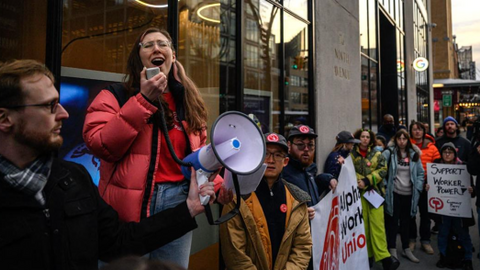[ad_1]

The established order perception is layoffs are inevitable due to globalisation and technological development. However they don’t should be.
Ever since Margaret Thatcher famously claimed, “There’s No Various,” mass layoffs have ripped by Western democracies. In good occasions and dangerous, workers are discarded en masse. In the US throughout the early Nineteen Eighties, the axe first fell harshly on industrial employees as manufacturing collapsed.
Now mass layoffs are crushing employees at tech corporations with a fury. Greater than 159,000 tech employees misplaced their jobs in 2022, and 78,000 extra simply in January 2023 alone. Since 1996, greater than 30 million employees have suffered by mass layoffs, accounting for practically a fifth of the US labour drive.
What’s inflicting this epidemic?
Shareholder capitalism
Mass layoffs, we’re informed, develop immediately from the 2 irreversible drivers of affluent economies: globalisation and expertise. Each company now competes in world markets that consistently create pressures to decrease prices as lower-wage workforces in creating nations efficiently compete.
These markets, we’re warned, are woven collectively by an unlimited array of applied sciences that permit for swift and exact coordination. And naturally, robotics and AI, are making thousands and thousands of jobs out of date – even people who require faculty levels. That is the march of the worldwide financial system, and mass layoffs, irrespective of how a lot human injury they trigger, can’t be stopped.
It’s a compelling and fatalistic story, nevertheless it’s removed from the reality. Mass layoffs aren’t inevitable. They’re the results of human choices, pushed by insurance policies additionally made by people, not robots. Whereas that course of differs country-to-country, the American instance is instructive.
When Ronald Reagan grew to become president, in 1980, he introduced with him a Thatcherite perception that authorities rules over non-public enterprises must be eradicated.
One of many first guidelines to go was the ban on inventory repurchases, which prevented companies from shopping for again their very own shares within the open market with the intention to increase their worth. That regulation got here within the aftermath of the 1929 inventory market crash, at which level inventory buybacks had been thought of unlawful inventory manipulation. Permitted as soon as once more, in 1982 Wall Avenue proceeded to strain companies to finance inventory buybacks and enrich shareholders.
Mass layoffs grew to become the quickest and easiest strategy to create the money movement wanted for inventory buybacks. Earlier than deregulation, the regulation allowed not more than two p.c of company income for use for inventory buybacks. At present, practically 70 p.c of all company income go to inventory buybacks.
Nearly each mass layoff has inventory buybacks lurking someplace within the background. That’s the case proper now at Google, Fb, and Microsoft, as these tech giants solid apart tens of 1000’s of employees and on the similar time reward their main traders with tens of billions of {dollars} in inventory buybacks.
Equally harmful, there may be nothing inevitable about allowing debt-driven mergers and acquisitions. That’s a coverage selection, not an financial crucial. These consolidations inevitably result in extra company debt that, in flip, results in extra mass layoffs.
Take Twitter, for instance. Elon Musk borrowed roughly $12 billion to buy Twitter after which positioned that debt onto the corporate’s books. Twitter’s debt funds jumped from $50 million per 12 months to over $1 billion. To make ends meet, Musk slashed the Twitter workforce by half.
There’s one other various
However isn’t this simply the regulation of the company jungle? Is it actually attainable for a worldwide company to efficiently compete with out resorting to mass layoffs?
An instance from Germany exhibits that it’s.
Siemens Power, with greater than 90,000 workers, rescinded its 2020 plan to terminate 3,000 German employees throughout a worldwide workforce discount of seven,800. As a substitute, after negotiations with the union IG Metall, it agreed to cut back its German workforce solely by buyouts and attrition. No worker can be pressured to depart, and no facility in Germany can be shuttered.
This no-forced layoffs settlement, mockingly, was made attainable by the co-determination system imposed on German trade by the Individuals after WWII. The US needed to tame the fascistic impulses of these industrial giants whereas additionally outcompeting Soviet socialism for employee allegiances. Half the seats on the company boards of German corporations are stuffed with employees and their union representatives.
Whereas these empowered employees don’t totally management their companies, they do have a substantial amount of enter and entry to info. And but, as everyone knows, German companies compete very efficiently in world markets.
The economics of mass layoffs is de facto about energy. When the stability is tilted closely in direction of capital, as it’s within the US, mass layoffs happen and not using a second thought. Lately they’re largely accomplished with mass emails, typically accompanied by crocodile tears from billionaire executives who take “full duty.” In Germany, unions nonetheless have sufficient energy to drive world companies to assume twice earlier than dismantling their workforces.
The influence of mass layoffs goes far past economics. The failure to supply job stability within the Western world has led to a rising rejection of elite liberal corporatism. Within the US, there’s a very excessive correlation between areas with the best mass layoff charges and the abandonment of the extra liberal Democratic Social gathering.
A telling instance is Mingo County, West Virginia, deep within the coronary heart of coal nation. In 1996, Invoice Clinton acquired 69.7 p.c of its presidential vote. After the variety of coal jobs over the following quarter century dropped from 3,300 to 300, Joe Biden acquired solely 13.9 p.c of its vote in 2020.
Extra disturbing nonetheless, mass layoffs are a transparent and current hazard to democracy. Our trendy democratic societies relaxation, largely, on religion that an open financial system will present secure employment alternatives for the overwhelming majority of us.
Mass layoffs undermine that legitimacy. There isn’t a financial occasion extra damaging to the well being and well-being of grownup employees and their households than struggling by a mass layoff.
When working individuals consider that your entire political and company institution is unable to supply job stability a harmful thought can come to those that are left behind: Why not give authoritarians an opportunity in the event that they may help safe your job?
There higher be alternate options, and shortly.
Disclaimer: The viewpoints expressed by the authors don’t essentially replicate the opinions, viewpoints and editorial insurance policies of TRT World.
We welcome all pitches and submissions to TRT World Opinion – please ship them through e-mail, to opinion.editorial@trtworld.com
[ad_2]
Source link


